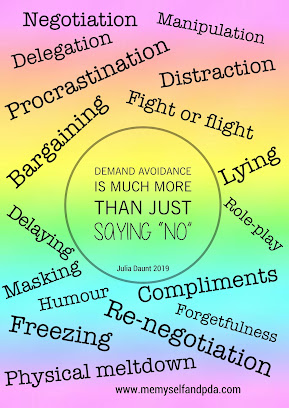Let's talk about... MELTDOWNS
Imagine that you are struggling to stay calm; to control your impulses and to stop doing something, if needed; to do something because it is necessary, even if you don’t want to; to recognize how you’re are feeling; or to match emotions to events. There may come a point when the inner pressure would be too intense and you would feel as if you would explode unless you found an outlet for what is going on inside you.
Something like that can happen to your autistic partner and the result might be what we call a meltdown.
A meltdown is not a tantrum. When a person is having a meltdown, they have no involvement in the social situation. They are not concerned for their own safety. They don’t care if others react to their behaviour during the meltdown or not.
Meltdowns appear to follow a cycle. They are not an act of manipulation; they are the only behaviour the person has to react to the situation at that particular moment.
THE STAGES OF AN
AUTISTIC MELTDOWN:
1) The rumbling stage
2) The raging stage
3) The recovery stage
THE RUMBLING STAGE:
Some of their rational thinking ability is still intact, so the full-scale meltdown can still be prevented.
Examples of rumbling behaviours are fidgeting, swearing, making noises, refusing to co-operate, tears, tensing muscles, name-calling, increasing or decreasing the volume of their voice, tapping a foot, and verbal threats.
What can you do? Remain calm, use a quiet voice, acknowledge their difficulties, take deep breaths, propose going for a walk without talking, be flexible because your partner can’t be flexible at this stage, not get close, or remind them of self-calming activities (such as breathing exercises or mindfulness of the body).
THE RAGING STAGE:
The autistic person may get verbally or physically explosive, get emotional, scream, hurt themselves, destroy objects, etc.
What can you do? Think Safety First: protect the person, the environment and others. Learn to disengage emotionally. Remove any onlookers/audience. Execute a “graceful exit strategy”. Use few words. Prevent power struggle. Do not take behaviours or words personally. Less is more. Be aware of your own non-verbal cues. Take deep breaths.
THE RECOVERY STAGE:
Your partner may need time alone to recover, maybe even a nap. They may withdraw, maybe to a fantasy world. Some people will not remember what happened during the raging stage. They will still be vulnerable and in a fragile stage during the recovery period (so might we!)
What can you do? Allow to sleep, if necessary. Support the use of relaxation techniques. Do not mention the raging behaviour. Determine your partner’s individual needs and then redirect to a successful activity or special interest, provide space, do not make excessive demands, support with structure and remember that your partner is still in a fragile mental state. Take time so that you can also recover from the experience.
.jpg)
.jpg)


Comments
Post a Comment